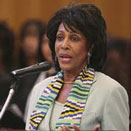

Waters cleared of House Ethics charges
By Freddie Allen
WASHINGTON, DC (NNPA) – After three years of steadfastly declaring her innocence, Rep. Maxine Waters (D-Calif.) has been finally exonerated of allegations that she violated ethics codes in connection with her role in advocating for the inclusion of minority-owned banks in the federal government’s Troubled Asset Relief Program(TARP).
Charges were filed against Waters with the House Ethics Committee (HEC) when it was discovered that her husband, Sidney Williams, owned shares in OneUnited Bank, one of the Black-owned financial institutions that benefited from TARP funds. Williams also served on the bank’s board from January 2004 to April 2008.
By September 2008, at the peak of Great Recession, One-United was on its last legs. The bank’s failure would have gutted Williams’ investment. In December 2008, a $12 million life raft, courtesy of TARP, rescued the bank and Williams’ stock.
The House Ethics Committee (HEC) conducted an investigation that spanned President Obama’s first term in office, lasting more than 1,200 days.
Congressional Black Caucus Chairman Emanuel Cleaver (D-Mo.) said there never should have been an investigation in the first place.
“Nobody wants to come to the defense of a member of Congress, even if that member of Congress has been falsely accused and everybody knows it,” said Rep. Cleaver (D-Mo.).
As Waters continued to profess her innocence, a leaked memo revealed that the Ethics Committee had engaged in questionable behavior, forcing five Republican members to recues themselves from the case. Veteran Washington lawyer Billy Martin, an African-American, was brought in to serve as independent counsel.
Last week, Martin reported that there was no evidence that Waters breached the ethics code, effectively exonerating the 11-term congresswoman, pending the full vote by the ethics committee.
“The exoneration of [Rep. Waters] is a demonstration in no small part to the unjaundiced [sic] work of the new ethics committee and it’s also a statement of their courage,” said Cleaver.
Walters’ Chief of Staff, Mikael Moore, may still be in trouble for his role in tracking down bail money and Hill support for OneUnited.
“It’s kind of odd to exonerate her and then find a member of her staff responsible,” Melanie Sloan, the executive director of Citizens for Responsibility and Ethics in Washington, a non-partisan group that advocates for ethics and accountability in government. “Usually, they find that members are responsible for the conduct of their staff.”
Sloan said that she found most of Moore’s answers during his testimony hard to under-stand and Rep. Donna Edwards (D-Md.) who sat on the ethics committee, said that many of his statements “strained credibility.”
Yet, Moore personally held no personal financial stake in the bank, which raised more questions for congressional ethics experts such as Sloan, who wondered why the committee would still be looking at whether Moore’s actions amounted to conflict of interest.
Sloan questioned Moore’s initial hiring in 2008. Moore not only served as Waters’ chief of staff, he is also her grandson.
Currently, House Ethics rules ban members of Congress from hiring and promoting relatives, but the House Ethics Manual doesn’t specifically cover grandchildren.
The House Ethics Manual nepotism policy states that:
“The statute defines a relative, for these purposes, as ‘an individual who is related to the public official as father, mother, son, daughter, brother, sister, uncle, aunt, first cousin, nephew, niece, husband, wife, father-in-law, mother-in-law, son-in-law, daughter-in-law, brother-in-law, sister-in-law, stepfather, stepmother, step-son, stepdaughter, stepbrother, stepsister, half brother, or half sister”.
Sloan said, “I think the anti-nepotism rule that exists in Congress should be wider to prohibit a member from having a grand-child as their chief of staff.”
George Derek Musgrove, a history professor at the University of Maryland, Baltimore County agreed.
“There’s a likelihood that this case will lead to a reform of these rules so that [Moore] can no longer be in that position,” he said.
But Waters has been a long-time advocate for Black banks.
“Smaller banks and Black banks did not do well with TARP as compared to the larger banks and [Waters] should have been advocating for them robustly,” said Musgrove. “But in doing that she opened herself up to an investigation of this sort.”
He explained, “In its handing out of money through the stimulus program or TARP, it’s very difficult for members not to find themselves one person removed or two people removed from conflicts of interest,” said Musgrove.
The voters need to be conscious of such conflicts and what they mean regarding the morals, the ethics and the actual impartiality of the politicians they elect, said the UMBC history professor.
He added, “Based on our current political climate, it is all but certain that conflicts like this, both real and imagined, will come up in the future that both political parties will try to use them against the opposition and that voters will find them-selves in a difficult position yet again, trying to figure out whether their member really does deserve sanction or if they’re just doing the same thing that everybody else is doing.”


Be the first to comment